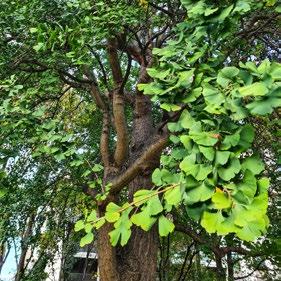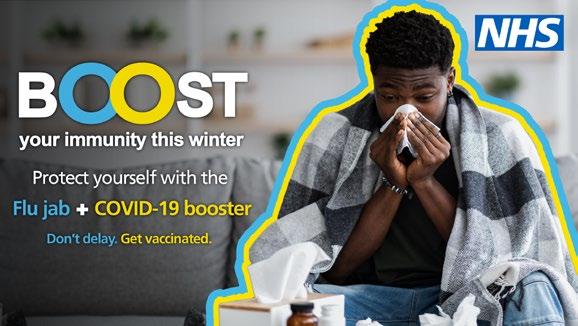
7 minute read
Festive recycling – how to reduce
Doing the Southwark Walk
Now is the perfect time to get out and about in Southwark’s many parks for a brisk, healthy walk 1. The Oak of Honour
Walking regularly is well known to be good for your health. It’s great exercise, it improves your mood and it gives you some quiet time to gather your thoughts and recharge your batteries.
Summer days can be very hot but autumn and early winter can provide a cool, comfortable climate for walking. It’s also the perfect time to enjoy the beautiful, rich seasonal colours of the trees and foliage that fill our parks, alongside a vast array of birds, insects and animals.
Despite being an inner London borough, Southwark is home to more than 363 parks and open spaces totalling around 599 hectares of green space. That’s the equivalent of around 1,120 football pitches. So, no matter which part of the borough you live or work in, you don’t have to go far to find a peaceful space in which to get a break from city life.
Add to that the many pleasant waterside walks – including the borough’s Thames-side paths and the various routes that wind their way around the old docks – and you could walk for days without ever having to retrace your steps. This year the council scooped more Green Flag Awards than any other borough apart from one for keeping our parks in great condition. Alongside all the sports and play facilities, the outdoor gyms, cafés and gardens, many of our parks also feature wild planting, mature trees, ponds, woods and dedicated nature areas.
So, on your next walk in a Southwark, why not try and spot some wild planting or some of our best trees. To get you started we’ve produced a guide to six of the favourite trees dotted throughout our borough. How many will you spot on your next walk?
Did you know?
One Tree Hill. This Oak is named after and roughly on the spot of the original Oak of Honour, where Queen Elizabeth the First is said to have rested on a visit to Lewisham.

Southwark Council planted more than 1,700
new trees
in the last two years. We look after
91,000
trees
on council land. We want
100,000
trees, and are working to make Southwark the first Inner London borough with this many.
Some of our favourite trees
This year we’ve been celebrating some of Southwark’s finest trees.
2. Oriental Plane
St Giles Churchyard, Camberwell. This Plane tree is fancier than the common London Plane. It is more squashed than is typical, and is probably one of the oldest Oriental Planes in Southwark.

6. Schinus molle
Burgess Park. This tree is one of a pair, they’re known as Peruvian Pepper trees. The Peruvian Pepper tree is an evergreen that is not often seen in London. It comes from southern Brazil and the Peruvian Andes and copes better than most in a drought.

3. Black Walnut
Southwark Park. This could easily be the only Black Walnut in Southwark. They come from North American where the hard, dense, and resilient qualities of the wood, make it a popular material for made-to-measure gunstocks.

4. Dulwich Park Oak
Dulwich Park. This Oak tree is known locally as the toilet oak… because it is close by a toilet block, which you can see in the bottom right of the picture!


5. Ginkgo Biloba
St Mary Magdalen Churchyard, Bermondsey. You can recognise this tree by its unusual leaves. The Ginkgo Biloba comes from China, where some make 50 metres tall. They produce attractive, fruitlike, yellow-brown seeds, which smell like rancid butter or vomit when crushed!


Stay healthy this winter
During winter it can be harder to keep well and we are more vulnerable to some health conditions. Here are a few things you can do to help keep yourself well this winter.
Get a COVID-19 vaccine: boost your immunity
Boost your immunity this winter by taking up a free
COVID-19 vaccination if you’re eligible.
You can get a booster if you're: • aged 50 or over • pregnant • aged five and over and at high risk, or living with someone at risk • aged 16 and over and a carer • a frontline health and social care worker.
You can also still get a first or second dose of the COVID-19 vaccine if you've not had one yet.
To get a COVID-19 vaccination: • Go to www.nhs.uk/covid-vaccination to book or for walk-in clinics • Call 119 (support in 200 languages) • If you have difficulties communicating or hearing, or use British Sign Language (BSL) use textphone 18001 119 or the NHS 119 BSL interpreter service (signvideo.co.uk/nhs119).
Aged 40 to 74? Get your NHS Health Check
The free check can help spot early signs of stroke, kidney disease, heart disease, type 2 diabetes or dementia. As we get older, we have a higher risk of developing one of these conditions. You’re eligible if you are 40 to 74 and don’t have a preexisting condition including heart disease, diabetes, stroke, high blood pressure, inherited high cholesterol, or you’re taking statins to lower your cholesterol. You should get invited every five years. If not you can contact your GP surgery to book one. Find out about the test and how to improve your results at www.nhs.uk/nhshealthcheck Autumn 2022
Get medicines or health care advice free from your local pharmacy
Are you registered with a Southwark GP and do you get your prescriptions free? If so, you can get certain medicines free from your local pharmacy without needing to visit your GP. If you pay for your medicines you can still get free advice. Once you are registered, the Pharmacy First scheme provides professional health care advice, treatments, and medicines for common illnesses from your local pharmacy, without the need for an appointment. The conditions include allergies and hay fever, athlete’s foot, cold sores, conjunctivitis, coughs and colds, earwax, headache, head lice, indigestion, mouth ulcers, nappy rash, piles and teething. To find out which pharmacies are part of the scheme, look for the logo, ask your pharmacist or find out more at www.selondonics.org/in-your-
area-southwark-pharmacy-first-scheme


Free flu vaccines: boost your immunity
Flu (influenza) is a very common and infectious illness. It is much more severe than the common cold. If you get flu it often results in at least two to three days in bed, leading to missed work or school days. More people are likely to get flu this winter as fewer people will have built up natural immunity to it during the COVID-19 pandemic.
The flu vaccine is safe and effective. It’s safe to have it at the same time as a COVID-19 vaccine (see above). Most children will get the vaccine as a spray in each nostril. The vaccine is offered to people most at risk of getting seriously ill from flu, or who are most likely to pass it to other people at risk including: • children aged 2 to 10-years-old • pupils in year 7, 8 and 9 • people aged 50 years and over • people in clinical risk groups • health and social care workers • pregnant women. School-aged children and young people will be offered the flu vaccine in school. If you fall into the other eligible groups, you can have the NHS flu vaccine at a pharmacy offering the service, your GP surgery or your midwifery service if you're pregnant. Get the flu vaccine if you’re invited or find out more at nhs.uk/flujab.
Stop cancer before it starts: use your bowel screening kit
If you’re aged over 56 and registered with a GP, you will be sent a NHS bowel cancer screening kit through the post. The kit tests for early signs of bowel cancer. Bowel cancer is one of the most common cancers. Anyone can get it. The test can help prevent bowel cancer or find it at an early stage when it’s easier to treat.
The test is easy to do and does not hurt. You provide a small sample of poo that you post back to the NHS in the kit from a post-box (you don’t need a stamp). Your sample is checked in a lab for tiny amounts of blood. Blood can be a sign of polyps or bowel cancer. Polyps are growths in the bowel. They are not cancer but may turn into cancer over time.
Return your kit today and you could stop bowel cancer before it starts.





